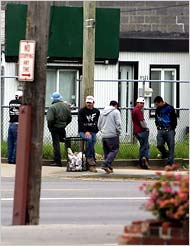
Interesting article in the
New York Times on a suburb in
New York where enterprising home owners rent basements to illegal migrants.Of one unhappy local it says:
There is the gas station a dozen blocks away where more than 100 immigrant day laborers gather, leaving garbage and distress along a residential side street [pic] — and undercutting wages for miles, contends Mr. Nicolosi, 49, a third-generation union man and former Wonder Bread truck driver who retired after a back injury. There are the schools and hospitals filled with children from illegal apartments like the basement dwelling, which Mr. Nicolosi calls "a little dungeon, windowless."...It is the economics of class, not the politics of culture or race, that fires Mr. Nicolosi's resentment about what he sees in Elmont, which is probably as diverse a suburb as exists in the United States. Like many working-class Americans who live close to illegal immigrants, he worries that they are yet another force undermining the way of life and the social contract that generations of workers strived so hard to achieve..."It's either a country of law and order and what my parents fought for, or we just turn it over to big business," he went on, working himself into a speech that connected many dots.
But the 'illegals' say:
From the basement, what struck the Mexican couple, however, was that Mr. Nicolosi did not work. "The man has nothing to do except look," the wife said in Spanish as her husband cooked dinner. Recalling the Latino workers she saw renovating his house, she added, "If we weren't here, who would do the work?" In Guanajuato, Mexico, Mr. O.'s best option was a job at General Motors that at the time paid $10 a day, he said. Like everyone, he added, "we came for a better life for our children." What of the union battles of Mr. Nicolosi's grandparents? "That's what we're doing now," Ms. O. said. Taxes? "We all consume," Mr. O. argued, with a gesture that took in the dining table, the television and a picture of the Last Supper. "I'm paying the rent, so I'm paying the homeowner's taxes."

